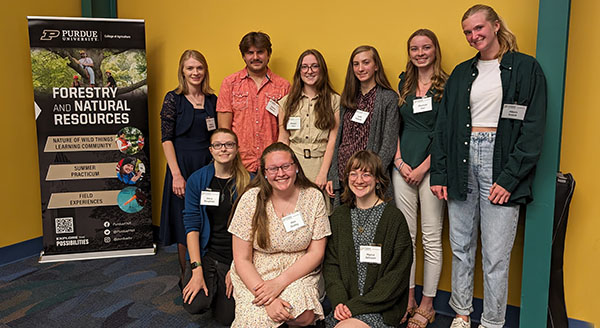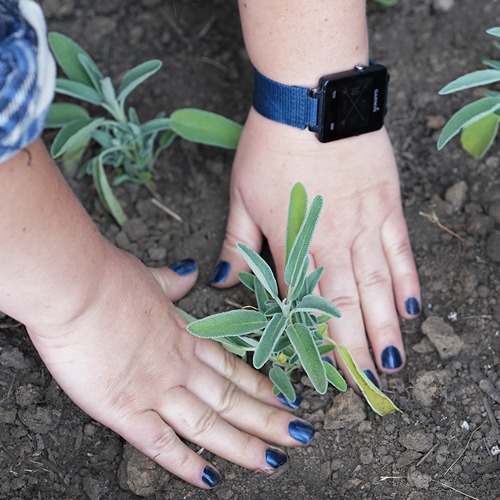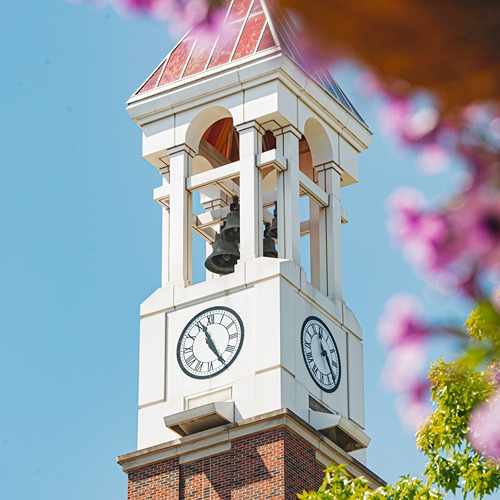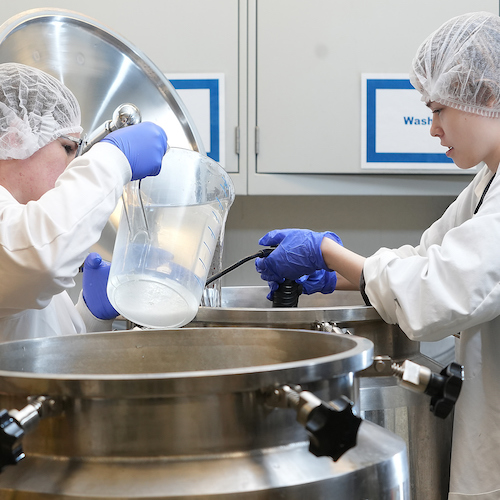Cade Kane, a PhD candidate in the Department of Botany and Plant Pathology, will use a Fulbright Fellowship at the University of Tasmania (UTAS) to study the effects of climate change on deciduous forests. But even while he’s on the island south of the Australian mainland, Kane’s research will remain firmly rooted in Indiana.
“Day length in Tasmania is the same as here,” he explains. Length of days is one of the drivers of senescence — the process by which leaves change color and die in the autumn and a focus of Kane’s doctoral research at Purdue. “They have about the same summer temperatures but mild winters. So the idea is to use Tasmania as sort of a proxy for what we might be experiencing in the Northern Hemisphere 100 years from now, with climate change, and how that will affect the leaf lifespan of deciduous trees.”
“Cade’s cutting-edge research will investigate how leaf lifespan will respond to climate change — a critical unknown,” says his Purdue advisor Scott McAdam, assistant professor of botany and plant pathology. “There are very few places where deciduous trees grow on the earth that are on identical latitudes north and south of the equator but Indiana and Tasmania at around 40 degrees north and south of the equator provide the ideal comparative environments to investigate the effect of temperature on leaf life span in deciduous trees. There are almost no other places in the world where such comparative studies using the same individual plants could be conducted.”
Kane will conduct his research over 10 months in the lab of Tim Broadribb, McAdam’s PhD advisor at UTAS. “Cade is likely to get a strong feeling of déjà vu as he steps into the lab of my formative years in Tasmania,” McAdam says, “but the native Gondwanan flora and world heritage wilderness will certainly provide considerable botanical contrast to Indiana.”
“Tim is considered a giant in the field,” Kane says. “Tasmania is a huge hub for plant hormone biology, plant hydraulics and plant physiology — not just Tim, but a lot of good researchers are down there.”
The tight-knit community of scholars doing related research normally meets every other year, alternating between the U.S. and Europe. Kane returned from the U.S.-based conference in June and will travel from Australia to Germany to speak at the fall conference.
 Cade Kane, a PhD candidate in the Department of Botany and Plant Pathology, will use a Fulbright Fellowship at the University of Tasmania (UTAS) to study the effects of climate change on deciduous forests.
Cade Kane, a PhD candidate in the Department of Botany and Plant Pathology, will use a Fulbright Fellowship at the University of Tasmania (UTAS) to study the effects of climate change on deciduous forests. His path to a Fulbright started as an undergraduate at Purdue, when he studied abroad in Ireland and volunteered in the lab of a plant physiologist. “At the time I worked in a completely different field than I do now,” he recalls. “She was inspiring to me, and I learned a lot of cool things.
“When I came back, I was looking for a PhD position and I met Scott. He had just started [at Purdue], and when he told me what he worked on, I said, “Oh, this sounds familiar. Do you know Jenny McElwain from University College Dublin?” McAdam did indeed know McElwain, who is prominent in their field. “That was a connection and how I ended up in the lab I’m in now,” Kane says.
The physiological drivers of autumn color change have received surprisingly little scientific attention. “Cade’s work addresses highly relevant questions that will have a local to global impact as well as important scientific implications to plant ecophysiologists and the general public,” McAdam says.
“The results will have a considerable impact on understanding and predicting how forests will respond to climate change, as well as how one of the most recognizable changes to trees occurs.”
Being part of the interdepartmental Center for Plant Biology (CPB) graduate program at Purdue has benefited his work, Kane says. He gave a talk at the CPB’s first post-COVID symposium in May, which “got everyone reintegrated, talking and sharing ideas,” he says. “Basically, it’s the collaboration that the CPB fosters. The disciplines are so varied so if we don’t have the skills and equipment to do, say, a genome sequence of a plant, we know there’s two or three people in the CPB who do.
“The diversity in plant research happening in the College of Ag and the CPB is pretty incredible.”
Kane has never been to the Southern Hemisphere, but McAdam and his wife, a fellow Australian who also holds a PhD from UTAS, have helped him prepare to arrive in Tasmania around September 1. He hopes he will feel as supported in the Brodribb Lab as he does in the McAdam Lab.
While he focuses on the elusive triggers of leaf senescence, Kane has some tourism in mind, too, centered around MONA (the Museum of Old and New Art) in Hobart, Tasmania. “Every year on the summer and winter solstice — I’m going to be there for both — they have huge festivals of performance art and theater and music, so I’m really excited to see the museum and those festivals as well.”
Kane expects to complete his PhD in August or December of 2023, after his return from Tasmania. “I’d like to stay in research if I can and eventually become a professor somewhere,” he says.
A Fulbright Fellowship among his other credentials will certainly increase his opportunities.





